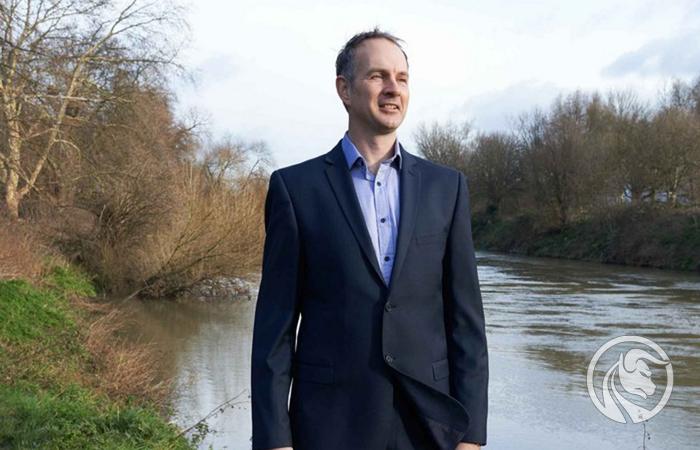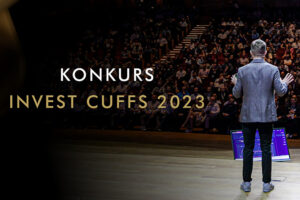Interview with the star of FxCuffs 2018 - Steve Ward
The fourth edition of the FxCuffs Conference is behind us. He confirmed the enormity of impressions, emotions and, above all, knowledge. The star of this year's edition of the event was Steve Ward. We invite you to read an extensive interview with Steve, in which we focus on the psychological aspects of investing and the problems that investors often face. The interview was conducted by Paweł Mosionek, editor-in-chief.
Experienced psychologist, coach of professional stock market players, as well as managing director at High Performance Trading. Has a long-term trading experience on the currency market and stock market indices. He is the creator of specialized training programs targeted at individual and institutional investors. It supports the largest financial institutions in the recruitment and development of employees. In his career, he managed the 50 group of professional traders and participated in the consultation of the scenario for the famous BBC television program - Million Dollar Traders.
In the training process, stock exchange investors combine techniques taken from sports psychology, behavioral finance and cognitive sciences. His approach helps investors develop the necessary skills to achieve success and thus brings them closer to achieving the intended investment goals. Steve is also the author of the bestseller Fri "The Psychology of Effective Trading".
Paweł Mosionek (PM): Steve, you are an experienced psychologist and world-famous professional trainer of traders. How did it all start?
Steve Ward (SW): Initially, I worked with athletes and sports psychology coaching teams in over 30 disciplines around the world. In February 2005, I was contacted by an international investment group asking if I would be interested in supporting them in the field of sports / performance psychology for their traders. I didn't know much about investing at the time, but I said yes, which made me start working for them three days a week, offering coaching and training. Then, since 2006, I have specialized in supporting traders and fund managers with performance and psychology.
PM: What was your first investing experience?
I did not invest until I started working with traders in the 2005 year. I felt that in order to better understand the language and nature of trade, and to gain more insight into psychological elements, I should learn to invest. I participated in several training for graduates in the trading group in which I worked, and then I went through some more advanced training and received mentoring from a client who is now my good friend. It was he who infected me with trading on the Mini-Dow index, as well as on the forex market.
PM: You're the Managing Director at High Performance Trading. What do you do there?
Well I'm a one-man band so basically I do almost everything! My main role, however, is to offer performance training, training and advice to clients who are typically banks, hedge funds, investment managers, energy traders and utilities, and independent groups of traders. This means that I usually meet clients, develop materials and programs, and conduct coaching or training. I provide services all over the world - in over 30 countries - so I travel a lot! In my spare time, I read and research a lot (over 50 books a year), and I also try to write a new book every few years.
PM: So you're a very busy man. Do you have enough time for independent trade? If so, what time perspective do you prefer?
No, I just do not have time to focus on independent trading, because all year I am completely absorbed in coaching, training and consulting, and everything else that is related to running my business. I still have an eye on the markets and of course I get a lot of comments and forecasts from the traders and fund managers that I work with.
PM: What emotions are the most destructive in traders? What, above all, prevents them from earning money?
It all depends on the trader and the strength of emotions, as well as on the ability to regulate them. Some traders are very emotional when making transactions, others are less. There is often talk of fear and greed, but I would say that this overconfidence is the most destructive, because then people tend to be at greater risk. Therefore, potentially large losses and associated psychological experience are more pronounced.
READ NECESSARY: How to deal with a bad run in trading?
PM: Now I will ask the other way around - what features do you think an effective trader must have? Can they be somehow acquired, trained?
The most important skills a trader needs are good trading skills, knowledge and an effective investment strategy. Of course, anyone can get these. If the trader has these elements, then the psychological elements become much more important. On a psychological level, I believe resilience is one of the key skills. So is stress management, coping with short-term discomfort, hardships and losses. There are many investment challenges when traders are looking for short-term comfort at the expense of long-term profits. Another word for this is danger tolerance. And yes, it is trainable - it's a psychological skill.
PM: The earlier question about the time interval was not accidental. Have you noticed a close relationship between the used interval and the level of stress in traders? One would assume that the lower the time perspective, the greater the psychological burden. Is it really like this?
Basically, I would say that a higher frequency of transactions and a shorter investment period are more stressful than long-term trade or investment. Taking risks in uncertain markets, with a shorter time frame, is more difficult for the brain, increases reaction to stress and increases traders' compliance with bias. Another effect of shorter transactions is the number of decisions made each day and how people manage their cognitive energy and how they deal with many ups and downs that can happen in a very short time. However, due to sufficient practice and exposure to such phenomena, traders can of course successfully train and achieve success, but it requires the development of high resistance to stress. Research shows that experienced traders are less prone to stress in markets with high volatility than, for example, novice traders.
PM: Do you think that everyone can become a trader?
Can anyone become a footballer, tennis player, artist, musician? In each of these competitions there is a progression of skills. We can all learn how to play football, play an instrument or paint, and even learn how to invest. But will we all become world-class professionals? Probably not. The requirements for gaining experience and success in every field are so demanding that very few people will reach the highest level. I think people can learn to invest, but realistically, not everyone will become a profitable investor, a professional trader or a market wizard.
PM: You conduct many trainings, also in Poland. Do you think the approach to trading traders from Poland differs from other traders?
I have been conducting trainings for traders in Poland since 6. Many of them learn from organizations and / or mentors who are located in the United Kingdom / USA / Globally, so their methods are very similar to other traders. Not all traders are the same as not all Polish traders. There are many different approaches, styles and of course personalities.
PM: In your career, you've managed to manage a large, as many as 50-personal, group of traders. What was the most difficult thing to manage? Everyone has a different personality. But are you sure?
For about a year I was involved in the construction of a team of traders. It started with 10 people, and eventually came to 50. The biggest challenge for me and my colleague was that we had to run a training program, develop traders, manage them and monitor their results. It was a very demanding and time-consuming role, but I learned a lot more about this business and met wonderful people.
PM: Investing from the perspective of the retail and institutional trader is different. Is it like that from the psychological side?
The basic psychological challenges that affect traders and investors, both retail and institutional, are basically similar. Aversion to risk, grief and uncertainty, overconfidence, fear, loss series, lack of profits, making transactions that they should not, not entering into transactions that they should implement, seeking consolation in the short term of long-term profits. The specific contexts around them, their regularity, impact and consequences are of course different.
PM: Investing is not just about emotions. It is also a transaction system. Or maybe I am wrong and it does not matter much?
Most people believe that trading and investing should be emotionless. Emotions are not only part of being human, they are also an integral part of the way we make decisions. We feel before we think. You can't make decisions without being emotionally involved. The key is to develop awareness and emotional regulation skills to be able to work with them effectively. For example, fear is an emotion that tells us there is a potential risk and mobilizes energy to deal with it. Excitement is the emotion that tells us that there is a potential reward that mobilizes energy to grasp it. Risk and reward - could you be an effective trader if you were not able to identify and react to risk and reward situations in the market?
PM: A popular problem among retail traders is the situation in which they can earn but only small money. When the volume grows and the account balance expands, they can not cope with emotions. Is there a simple way to deal with it?
Many retail traders increase their transaction volume too quickly and too randomly. If traders increase the risk in a more controlled way, taking into account their own abilities and skill level, the effectiveness of their trading strategy, market conditions, account size and their personal context, then they can deal more effectively. I also use test techniques and mentality techniques to help investors adapt to their increased size.
PM: Trading is hard work, often in solitude, which can be very stressful. Let us now assume an optimistic variant. We are effective traders who record regular positive results. What can we do to keep it as long as possible and avoid professional burnout?
Maintaining a high level of concentration and effort as well as coping with challenges and requirements in order to be successful in trading at a given time can leave a mark on the entrepreneur's mind and body, causing a sense of tiredness, low motivation and lack of satisfaction with trade. To help reduce this phenomenon, the most important thing for a trader is to focus on maintaining a high level of personal well-being by building good habits related to sleep, nutrition, physical activity and health. In addition, looking for a balance of non-trading activities is very helpful. Just like spending time with people who release positive emotions.
PM: The statistics are brutal - they say that 80% of traders lose in the Forex market in the long term (some say they are understated). What would you advise this majority?
The percentage of players who ultimately play professionally is very small, as are tennis players, musicians, artists, etc. In all areas, also in investing, you do not know if you'll be good at it or not, or how far you can go, unless you try. So if you're interested in trading and investing, it's definitely worth a try, but let's be realistic and take into consideration that it will take years for us. We will have to put in a lot of effort and attention to develop a high level of investment skills, get to know the market, investment strategies and acquire the required psychological skills. My simple advice is to do the best possible training, coaching and mentoring, developing strong risk management skills, practicing them as much as possible in financial markets, continuous education about markets and trading, learning from your mistakes and successes, and working on your skills psychological.
PM: Steve, thank you very much for your time and the interview.
Also thank you.






















![Forex Club – Tax 9 – Settle tax on a foreign broker [Download the Application] Forex Club - Tax 9](https://forexclub.pl/wp-content/uploads/2024/02/Forex-Club-Podatek-9-184x120.jpg?v=1709046278)
![Trading View platform – solutions tailored to the needs of traders [Review] trading view review](https://forexclub.pl/wp-content/uploads/2024/03/trading-view-recenzja-184x120.jpg?v=1709558918)
![How to connect your FP Markets account to the Trading View platform [Guide] fp markets trading view](https://forexclub.pl/wp-content/uploads/2024/02/fp-markets-trading-view-184x120.jpg?v=1708677291)
![How to invest in ChatGPT and AI? Stocks and ETFs [Guide] how to invest in chatgpt and artificial intelligence](https://forexclub.pl/wp-content/uploads/2023/02/jak-inwestowac-w-chatgpt-i-sztuczna-inteligencje-184x120.jpg?v=1676364263)


![WeWork – the anatomy of the collapse of a company valued at $47 billion [WeWork, part II] wework bankruptcy story](https://forexclub.pl/wp-content/uploads/2024/04/wework-bankructwo-historia-184x120.jpg?v=1711729561)
![Adam Neumann – the man who screwed up Softbank [WeWork, part AND] adam neumann wework](https://forexclub.pl/wp-content/uploads/2024/04/adam-neumann-wework-184x120.jpg?v=1711728724)





![How to transfer shares to another brokerage office [Procedure description] how to transfer shares to another brokerage house](https://forexclub.pl/wp-content/uploads/2024/03/jak-przeniesc-akcje-do-innego-biura-maklerskiego-184x120.jpg?v=1709556924)

![The most common mistakes of a beginner trader - Mr Yogi [VIDEO] Scalping - The most common mistakes of a beginner trader - VIDEO](https://forexclub.pl/wp-content/uploads/2024/03/Scalping-Najczestsze-bledy-poczatkujacego-tradera-VIDEO-184x120.jpg?v=1711601376)
![Learning patience: No position is also a position - Mr Yogi [VIDEO] Scalping - Learning patience - No position is also a position - VIDEO](https://forexclub.pl/wp-content/uploads/2024/03/Scalping-Nauka-cierpliwosci-Brak-pozycji-to-tez-pozycja-VIDEO-184x120.jpg?v=1710999249)
![When to exit a position and how to minimize losses - Mr Yogi [VIDEO] Scalping - When to exit a position and how to minimize losses - VIDEO](https://forexclub.pl/wp-content/uploads/2024/03/Scalping-Kiedy-wyjsc-z-pozycji-i-jak-minimalizowac-straty-VIDEO-184x120.jpg?v=1710336731)



















Leave a Response